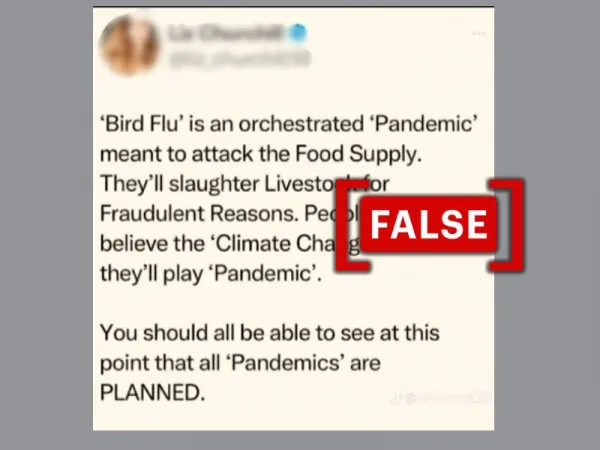By: Rahul Adhikari
June 27 2024
 Social media posts claim bird flu is an orchestrated pandemic to attack food supply. (Source: Instagram/Modified by Logically Facts)
Social media posts claim bird flu is an orchestrated pandemic to attack food supply. (Source: Instagram/Modified by Logically Facts)
The World Health Organization is monitoring the risk of the bird flu virus, and it has not been declared a pandemic.
What is the claim?
A post circulating on social media claims that bird flu is an orchestrated pandemic to attack food supply. The viral post includes a screenshot of a social media post that read, "'Bird Flu' is an orchestrated ‘Pandemic’ meant to attack the Food Supply. They’ll slaughter Livestock for Fraudulent Reasons. People don't believe the ‘Climate Change’ lie so they’ll play ‘Pandemic’. You should all be able to see at this point that all ‘Pandemics’ are PLANNED.”
A user shared the post on Instagram, where it garnered 3,136 likes. An archived version of the post can be accessed here.
A screenshot of the social media post. (Source: Instagram/Modified by Logically Facts)
However, the claim is false. Bird flu (avian influenza) has not been declared a pandemic and it is a type of viral infection that usually spreads in birds.
Bird flu and the origin of the virus
Bird flu (H5N1) is one of several influenza viruses that cause a highly infectious respiratory disease in birds called avian influenza, or “bird flu.” Infections in mammals, including humans, have also been documented.
The goose/Guangdong lineage of H5N1 avian influenza emerged in 1996, causing bird flu outbreaks. Since 2020, a variant has caused unprecedented deaths in wild birds and poultry globally.
It has not been "orchestrated" and is not a hoax: Scientists have been studying the virus since it emerged, and there is enough evidence for the virus spreading rapidly and causing deaths in poultry. The virus is also known to affect other animals, including ducks, turkeys, pigs, whales, horses, seals, dogs, and cats.
Not a public health risk
According to the U.S. Centers for Disease Control and Prevention (CDC), the current public health risk is low. The CDC is closely monitoring the situation and collaborating with states to track individuals exposed to animals.
The Media Relations team of the World Health Organization (WHO) told Logically Facts, “Based on available information, WHO assesses the current overall public health risk posed by A(H5N1) to be low, and for those with exposure to infected birds or animals or contaminated environments, the risk of infection is considered low-to-moderate.”
H5N1 virus infections in people result from close contact with infected birds or contaminated environments, like live bird markets. However, the virus does not easily infect humans. According to the WHO, between 2003 and 1 April 2024, a total of 889 cases and 463 deaths among humans caused by the virus have been reported worldwide from 23 countries.
Not a pandemic, or a 'plandemic'
The WHO has not declared bird flu (H5N1) a pandemic. A pandemic is declared when an infectious disease spreads across multiple countries and continents, affecting a large number of people. The declaration of a pandemic is made by the WHO, which collaborates with countries to prevent, detect, and manage human H5N1 infections and partners globally.
According to a BBC report, scientists have stated that the risk to humans is low, with rare bird-to-human transmission and no sustained human-to-human spread. While there is no way to predict if avian flu will trigger a human pandemic, experts are monitoring its spread and evolution.
Impact on food supply
Bird flu can impact the food supply, particularly poultry. Outbreaks often require widespread culling of animals displaying symptoms to contain the virus, leading to shortages of vital animal protein, especially in lower-income areas. However, no shortage of food supply has occurred despite recent outbreaks in a few countries, including the United States and Australia.
Agriculture officials in at least 17 states of the U.S. have restricted dairy cattle imports from states where the virus has been detected. The U.S. Food and Drug Administration (FDA) said in a statement, “Milk loss resulting from symptomatic cattle to date is too limited to have a major impact on supply and there should be no impact on the price of milk or other dairy products.” United States health officials have stated that food supply remains safe and stable; meanwhile, the FDA is carrying out constant testing of food items to ensure public safety.
In Australia, the virus has mostly affected egg farms. According to a Reuters report, around 1.5 million birds have been killed or are to be killed in Australia. However, no shortage of eggs has been reported so far.
While bird flu can have a limited effect on food supply, there is no evidence that the disease was orchestrated and is a planned attack.
The verdict
Bird flu, or H5N1 avian influenza, has not been declared a pandemic. The WHO and other government bodies are monitoring the risk of the virus as it evolves. The virus originated in 1996, and it is not a planned disease spread to attack the food supply.